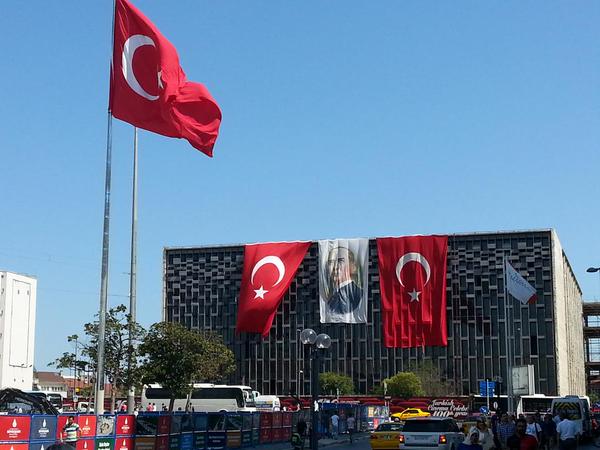Taking stock of the post-Ottoman Middle East
By Khaled Diab
As the post-Ottoman order crumbles around us, would the Middle East would have been better or worse off had Turkey remained neutral during World War I?

Wednesday 9 September 2015
A recent visit to Istanbul coincided with “Victory Day”, which marks the successful conclusion of the final battle of the Greco-Turkish wars, which Turkey calls its War of Independence.
While we wandered through streets draped with giant red Turkish flags and superhuman-sized portraits of Mustafa Kemal “Atatürk”, the father of the modern Turkish republic, my brain began to ponder a number of what-ifs.
As the century-old post-Ottoman regional order collapses all around us, I began to wonder what would have happened had Turkey not taken its disastrous decision to enter World War I or had emerged victorious from that murderous conflict. Would the Middle East be a better or worse place than it is today, or just different?
In light of how actual history is a complex and messy affair, often hinging on apparently mundane events as well as monumental moments, it is impossible to know how things could have been but it is possible to construct scenarios of how they could have turned out. And given how the current regional (dis)order depends on the events of a century ago, charting alternative realities can help illuminate our contemporary situation.
It is far easier to speculate about what would not have occurred. Had Turkey emerged victorious or not taken up arms, the Ottoman empire would not have been partitioned, and the Sykes-Picot carve up, which has given the Middle East some of its most troubled borders, would not have taken place – at least not then.
In addition, with the exception of the Maghreb and Egypt, French and British influence in the Middle East would have been negligible. However, German hegemony may have occupied a similar position. It is also possible that Mustafa Kemal would not have become Atatürk, as his outsized influence on Turkish history was a product of the existential anarchy triggered by the collapse of the old order.
But could Turkey have avoided war?
Owing to its weakness, the Ottoman empire was not regarded, in the pre-war years, as a useful ally and was shunned by all the major European powers, with the exception of Russia, but the terms offered by the Tsar would have turned Turkey into a Russian protectorate.
When war broke out, the “Three Pashas” effectively ruling the Ottoman empire felt that Turkey was obliged to enter the fray. They did not care on which side Turkey fought and regarded the conflict as an opportunity to “organise its domestic administration, strengthen and maintain its commerce and industry, expand its railroads”, in the words of Talaat Pasha, the grand vizier.
This strikes me as a strange expectation of war, that it would somehow lead to reform under fire. It seems to me that had Turkey maintained its original position of neutrality, it stood a better chance of achieving these goals. At the very least, it could have avoided the bloodiest excesses executed in the madness and fog of war, such as the Armenian genocide and the mass killings of other minorities, including Assyrians and Greeks.
It is entirely possible, of course, that a neutral Turkey would have been sucked into the black hole anyway – that powerful was its gravitational pull. Or it may have successfully dodged the First World War but been ambushed by the Second.
Neutrality also carried the risk of retribution from powers greedy for Ottoman land, at least that is what some Turkish leaders feared. “If we stayed neutral, whichever side won would surely punish Turkey for not having joined them, and would satisfy their territorial ambitions at our expense,” Talaat Pasha confided in his diary.
But had Turkey successfully sidestepped the conflict and the Ottoman empire survived the war, would this have been good, bad or simply different for the region?
The original “sick man of Europe”, the Ottoman empire was in a state of terminal decline long before the “Great War”. Relatively stagnant economically and scientifically, it was unable to keep pace with its European rivals.
As Ottoman power diminished, despite the Tanzimat and other modernisation drives, the empire became less tolerant and more oppressive and reactionary. This was especially so as it shed territory to foreign conquest, particularly Russia, and confronted the rise of nationalism, first in its European territories and then in its Arab regions.
Even without World War I, the unravelling of the Ottoman empire is likely to have continued. And with the Three Pashas transforming the democratic and liberal Young Turks movement into an absolute and ultranationalist dictatorship, Turkey's reaction to the emancipation movements among the peoples under its control is likely to have been brutal and harsh – possibly more so than without the distraction of World War I, though the tyrants would not have been able to conceal their crimes behind the thick fog of total war.
There is also the chance that, without the mayhem of World War I, the murderous rule of the Three Pashas – who came to power in a 1913 coup – would have been short-lived and the progressive Young Turks factions, such as the Freedom and Accord party, may have managed to regain power.
Rather than the implosion which occurred following World War I and the power vacuum it created, such a moderate leadership in Istanbul, which preferred jaw-jaw over war-war, could have potentially managed the crumbling of the empire, the possession of which was becoming too costly for the Turks anyway, in a gradual and more enlightened manner.
Such a progressive devolution of power may have helped prevent many of the rivalries and hatreds which have dogged the region for the past century. In addition, it may have helped the region's diverse populations maintain the advantages of the former Ottoman empire without its warts: a frontierless territory minus the imperial subjugation.
Without World War I, it is possible, but perhaps improbable, that an alternative reality which successfully squares the circle of local self-determination and regional integration would have emerged, either as a loose confederation of nation-states or a union of equal peoples living side by side in enriching diversity.
And transgressing narrow nationalism and factionalism remains, a century on from the Great War, the best hope for saving the Middle East from its current “world war”.
____
Follow Khaled Diab on Twitter.
This article first appeared on Al Jazeera on 3 September 2015.


Look at Turkey now. Economically mediocre, composed of many religious and ethnic communities where Kurds want to separate and take territory away and Sunni Turks are trying to suppress the disintegration wave by military means. Instead of wish-washing about a century old Ottoman sultanate, try to propose to Turks how to stop Yugoslavization and creation of 17 states in Anatolia.
I love this kind of history (which is often more interesting than the versions handed down!). It’s the What If? version – I’ve read several books of it. This is great. Anything that enables us to look at the present and the future with fresh eyes to solve burning issues!
really enjoyed this piece… very “sliding doors”.
More debate is available here: https://www.facebook.com/aljazeera/posts/10153702533713690